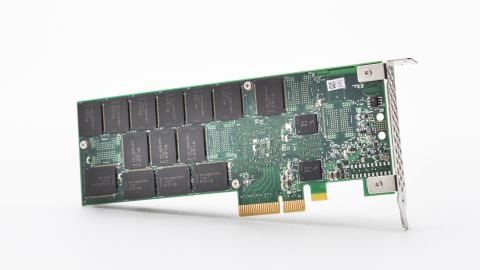Why you can trust TechRadar
There we have it then. Intel's SSD 750 is the fastest solid state drive we have ever tested, and by a pretty comfortable margin too.
It is, however, also one of the most expensive.
The problem with being a brand new technology, and being first to market, is that it will always command a supremely high price tag. That's especially true given there is still no NVMe competition.
Couple that with the fact it's Intel, and prices were always going to be sky-high. This is like the Extreme Edition CPU of solid state drives.
But there is a certain justification for it though. Intel has had to invest heavily in the background ecosystem of NVMe, working behind the scenes to ensure that all the mobo makers are able to get BIOS support for their Z97 and X99 boards.
The SSD makers who will follow up with inevitably cheaper NVMe-based SSDs wont have that R&D cost.
There's a little bit of the Titan X about the SSD 750 Series too. It shares the basic core silicon with it's professional-class brethren, the P3700, which means it has similar levels of performance. But the enterprise drive is nearly $5,000 (£3,367, AU$6,601) while this high-capacity, high performance drive is just $1,029 (£693, AU$1,360).
Looking at the cost per GB price makes the price look more reasonable. When Intel released the X-25M, the first real performance SSD (for all its subsequent faults), it cost $3.72 (£2.50, AU$4.91 )per GB. For this 1.2TB drive that translates to only 86c/GB (£0.58, AU$1.14).
We liked
The Intel SSD 750 1.2TB is the quickest SSD we've ever tested, and that's especially impressive given that it isn't trying to do any RAID-ing shenanigans to get to that level of performance.
Incidentally, you could RAID a pair of these drives if you crave the performance, and have no other need for a couple thousand dollars, but you will then only be able to use them as storage drives. RAID on the Intel SSD 750 will stop you being able to boot.
And that's another thing that impressed us about the drive: how easy it was to get set up.
It's actually simpler than an old SATA drive because all you need do is slot it into your motherboard and away you go. Once you've got the latest BIOS installed in your board, it's smooth sailing.
And Windows saw it just as quickly when installing a new OS.
We are also pleased to see that synthetic performance did translate into real-world gains too, with the Intel SSD 750 being over a minute quicker in our 30GB Steam folder transfer. It is also great to see the 4k random writes being given such attention, double what the top SATA SSD can manage.
We disliked
Obviously that $1,029 (£693, AU$1,360) price tag is prohibitive for most of us.
Though 86c/GB (£0.58, AU$1.14) is pretty good for a brand new storage technology considering Intel's previous, it's still a huge amount of cash for normal consumers.
It's also a shame the lower capacity drive, the Intel SSD 750 400GB, is in a 2.5-inch form factor with a non-standard connection. Hopefully Intel will release smaller, cheaper versions of the PCIe drive too.
Verdict
Okay, at the risk of sounding like we're Intel apologists here…
Yes, it is a crazy amount of cash for most of us to drop on an SSD, however quick it is, but there are some places where the value of the Intel SSD 750 1.2TB is going to be seen despite that ticket price.
Intel is looking first to the consumers running with huge data sets - the digital content creators, the engineers, the visual effects guys and eventually the game makers too.
Prices will quickly tumble as well.
This is the birth of NVMe. Now that the ecosystem is there, you can guarantee NVMe-based SSDs will be appearing from every SSD manufacturer in the tech world by the end of the year.
Once Marvell and SandForce's controllers are out in the wild the market is going to go crazy. We would bet Computex in June is going to be built upon a sea of NVMe drives…
And we also doubt this is as fast as an NVMe drive can get too - without comparisons the SSD 750 looks lightning-fast, but we'll know more once competing NVMe controllers are out on the shelves and in our test rigs.
For now though, the Intel SSD 750 1.2TB is as quick as it gets.

